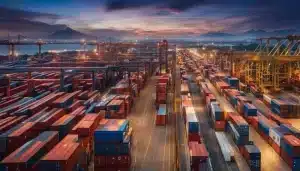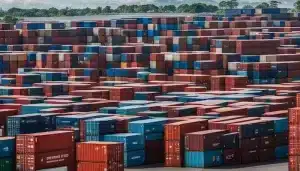Welcome to our article on container warehouse solutions in the Philippines. In this comprehensive guide, we will explore the benefits and challenges of utilizing container warehouses for your storage needs. Whether you are a business owner or an industry professional, understanding the landscape of logistics and warehousing in the Philippines is essential.
Container warehouses in the Philippines offer efficient and flexible storage options for businesses in various sectors. They play a crucial role in the logistics and warehousing industry, providing ample storage space, advanced security systems, and integrated logistics services. By utilizing container warehouses, you can optimize storage space, reduce operational costs, and easily move inventory to meet market demands.
However, implementing container warehousing also comes with its own set of challenges. Space and size limitations, regulatory hurdles, and logistical complexities can pose obstacles to businesses. Overcoming these challenges requires strategic planning and collaboration with experienced logistics partners.
In the following sections, we will delve deeper into the types and services offered by container warehouses, as well as explore the technological integration and environmental perspective of sustainable warehousing in the Philippines. By the end of this article, you will have a comprehensive understanding of container warehouse solutions, allowing you to make informed decisions for your storage needs in the Philippines.
Table of Contents

Exploring the Landscape of Logistics and Warehousing in the Philippines
The logistics and warehousing industry in the Philippines has evolved significantly in recent years, driven by its strategic location and the rapid growth of its industrial, retail, and e-commerce sectors. One key aspect of this industry is container warehousing, which has become a vital component of the country’s logistics infrastructure. Container warehouses in the Philippines offer several key characteristics that make them indispensable for businesses in the region.
One of the key characteristics of container warehouses in the Philippines is ample storage space. These warehouses are designed to accommodate large volumes of goods, making them ideal for businesses with extensive inventory needs. Additionally, container warehouses are equipped with advanced security systems to ensure the safety and integrity of the stored goods.
Efficient inventory management is another critical feature of container warehouses. Advanced technologies and state-of-the-art systems are employed to track, organize, and manage inventory effectively. This contributes to streamlined operations and improved supply chain efficiency.
Furthermore, container warehouses in the Philippines provide integrated logistics services, allowing businesses to handle both domestic and international operations effectively. From freight forwarding and customs clearance to transportation and distribution, these warehouses offer end-to-end solutions for businesses’ logistical needs.
In conclusion, the logistics and warehousing industry in the Philippines has witnessed significant growth and transformation, with container warehousing playing a pivotal role. The key characteristics of container warehouses, including ample storage space, advanced security systems, efficient inventory management, and integrated logistics services, make them indispensable for businesses operating in the Philippines. As the industry continues to evolve, container warehouses will remain a vital component of the country’s logistics infrastructure.
Container Warehouse Ecosystem: Types and Services Offered
The container warehouse ecosystem in the Philippines offers a variety of warehouse facilities and a wide range of services to cater to different storage needs. These container warehouses provide integrated cold chain facilities, cold storage, and dry storage options to accommodate various types of goods.
Within this ecosystem, container warehouses offer essential services to facilitate efficient logistics and inventory management. Real-time tracking allows businesses to monitor their goods throughout the storage process, ensuring transparency and peace of mind. Furthermore, container warehouses provide inventory management solutions that aid in organizing and maintaining accurate records of stock levels.
The distribution and logistics services offered by container warehouses streamline the transportation of goods, ensuring timely deliveries and efficient supply chain operations. These services include secure loading and unloading of containers, as well as efficient cargo handling and routing.
It is important to note that certain container warehouses specialize in catering to specific industries. For example, some warehouses are equipped with on-site cold storage facilities that meet the specific requirements of meat processors and other businesses dealing with perishable goods.
By understanding the types and services offered within the container warehouse ecosystem, businesses in the Philippines can make informed decisions about choosing the most suitable solution for their storage needs. Whether it’s a specialized cold chain facility or a generic container warehouse, these options provide businesses with the flexibility and efficiency necessary to thrive in the competitive market.
Benefits of Using Container Warehouses
Utilizing container warehouses in the Philippines brings several benefits for businesses. Firstly, these warehouses offer cost-effectiveness and scalability, allowing businesses to optimize storage space and reduce operational costs.
Container warehouses also provide flexibility in terms of location and mobility, enabling businesses to easily move their inventory to different regions to meet changing market demands. By strategically positioning their goods in container warehouses across the country, businesses can efficiently distribute their products and reach customers in various locations, effectively enhancing their sales and market presence. The scalability provided by container warehouses also allows businesses to adjust their storage needs according to seasonal demands and fluctuations in inventory levels.
The ability to quickly adapt to market shifts and reduce lead times is another major advantage of container warehouses. With the constant evolution of consumer preferences and demands, businesses need storage solutions that offer agility and responsiveness. Container warehouses provide the necessary infrastructure and systems to efficiently manage inventory and facilitate smooth distribution operations, ensuring timely delivery of goods to customers.
Furthermore, container warehouses in the Philippines offer superior security measures to safeguard valuable products. These warehouses are equipped with advanced security systems and protocols, including surveillance cameras, access control systems, and round-the-clock security personnel. This ensures that businesses can store their merchandise with peace of mind, minimizing the risk of theft or damage.
In summary, container warehouses provide businesses in the Philippines with cost-effectiveness, scalability, flexibility, location advantages, and mobility. These benefits make container warehouses an ideal choice for companies seeking efficient and adaptable storage solutions.
Challenges in Implementing Container Warehousing
While implementing container warehousing offers numerous advantages, businesses may encounter several challenges along the way. These challenges include space and size limitations, as container warehouses have specific dimensions that may not accommodate all types of goods. This can pose a challenge for businesses that deal with oversized or irregularly shaped items.
Another set of challenges businesses may face are regulatory hurdles. Implementing container warehousing requires compliance with customs regulations and other legal requirements. This can be a complex process, especially for businesses involved in international trade.
Logistical hurdles also play a significant role in implementing container warehousing. Efficient transportation networks are necessary to ensure seamless movement of goods between container warehouses and other parts of the supply chain. Businesses need to consider factors such as accessibility, proximity to transportation hubs, and the availability of reliable logistics providers.
To overcome these challenges, strategic planning and collaboration with experienced logistics partners are crucial. Working with professionals who understand the intricacies of implementing container warehousing can help businesses navigate space limitations, regulatory requirements, and logistical complexities.
Implementing container warehousing can present various challenges, including space limitations, regulatory hurdles, and logistical complexities.
Technological Integration in Container Warehousing
Technological integration plays a vital role in enhancing the efficiency and effectiveness of container warehousing in the Philippines. By leveraging smart technology and innovative warehouse management solutions, businesses can optimize their operations and improve overall productivity.
One of the key technologies driving the transformation of container warehousing is the implementation of Warehouse platforms (WMS). These systems enable real-time tracking of inventory, automating processes such as order fulfillment, stock replenishment, and picking operations. With accurate and up-to-date information, businesses can make data-driven decisions and streamline their warehouse operations.
Furthermore, the use of smart technology in container warehousing extends beyond traditional WMS. Innovations such as drones for stocktaking and robotics for material handling have revolutionized warehouse operations. Drones can quickly and accurately perform inventory checks, reducing the time and manpower required for stock audits. Robotic systems can handle heavy lifting and repetitive tasks, improving efficiency and reducing the risk of human errors.
By embracing these technological advancements, businesses can significantly improve the efficiency of container warehousing. Smart technology enables faster order processing, minimizes errors, and enhances inventory accuracy. This, in turn, leads to smoother supply chain operations, reduced costs, and improved customer satisfaction.
The integration of technology in warehouse management also enables businesses to gain valuable insights through data analytics. By analyzing warehouse performance metrics, businesses can identify areas for further optimization, forecast demand patterns, and improve resource allocation. These insights empower businesses to make informed decisions that drive continuous improvement and long-term growth.
In conclusion, technological integration in container warehousing offers tremendous potential for efficiency and innovation. By adopting smart technologies and leveraging warehouse management systems, businesses in the Philippines can optimize their operations, reduce costs, and enhance overall productivity.
You already know the benefits of using technology integration in the warehouse. So, you can start considering the calculation of warehouse software prices with HashMicro by clicking the banner below.
The Environmental Perspective: Sustainable Warehousing in the Philippines
Sustainable warehousing has become an essential consideration in the container warehouse industry in the Philippines. As businesses strive to minimize their environmental impact, they are adopting various initiatives to promote sustainability within their operations. One significant step is the reuse of containers, which not only reduces the demand for new materials but also decreases carbon emissions associated with manufacturing.
In addition to reusing containers, businesses are implementing energy-efficient practices to contribute to a more sustainable future. Utilizing technologies such as solar panels and optimizing lighting systems help reduce energy consumption, leading to a decrease in greenhouse gas emissions. By embracing energy efficiency measures, container warehouses in the Philippines are not only reducing their environmental footprint but also benefitting from long-term cost savings.
Furthermore, waste reduction strategies play an integral role in sustainable warehousing. Container warehouses are adopting recycling programs and implementing proper disposal methods for packaging materials to minimize waste generation. By promoting responsible waste management practices, these warehouses are contributing to the preservation of the environment and the overall sustainability of the logistics and warehousing industry.
Overall, sustainable warehousing in the Philippines is crucial for ensuring a greener future. Through initiatives such as reusing containers, adopting energy-efficient practices, and implementing waste reduction strategies, container warehouses are playing their part in protecting the environment while meeting the storage needs of businesses across various sectors. By prioritizing sustainability, both businesses and the community can benefit from a more environmentally conscious approach to warehousing.























